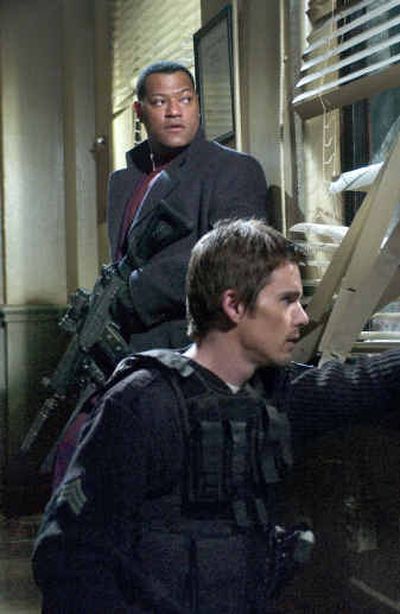‘Assault’ insults imagination

Imagination is a director’s most important asset, and director John Carpenter squandered his fast.
At first, there were the straightforward shocks of “Halloween” and the pulp pleasures of “Escape from New York.” But since then he’s been content to either repeat himself (remember “Escape from L.A.”?) or copy others (“Village of the Damned,” “The Thing”).
Even worse, now other directors are copying him. “Assault on Precinct 13” is a remake – excuse me, a “reimagining” – of a 1976 Carpenter thriller.
Carpenter’s original low-budgeter about a nearly abandoned police station under siege by criminals was borrowed heavily itself, mostly from Howard Hawks’ classic Western “Rio Bravo.”
Making a B-movie out of an old A-movie – which is what Carpenter did – is smart and fun. Making an A-movie out of an old B-movie – which is what director Jean-Francois Richet tries to do here – is just sort of silly, and wasteful.
This new “Assault on Precinct 13” stars Ethan Hawke as a stressed-out cop, Laurence Fishburne as a gangster kingpin, John Leguizamo as a frenetic junkie, Maria Bello as a police psychiatrist and Brian Dennehy as an old-school cop putting in one last day before retirement. The big- name casting just feels wrong.
It isn’t just that Hawke looks more like an overworked teaching assistant than a weary cop. It’s that Fishburne and Leguizamo and Bello and Dennehy – Dennehy, who recently tore through four hours of “Long Day’s Journey Into Night” on Broadway – have outgrown this sort of movie.
Fishburne and Dennehy respond by walking through their roles, Bello and Leguizamo by wildly overacting theirs.
Director Richet, a newcomer to America and apparently not much of an English speaker, concentrates on images and action. Though some of his shots are ludicrously melodramatic, several of the action scenes cut together well. The script, which adds a new side to Carpenter’s tale of cops and robbers, even contains three good twists (though one is fairly predictable and another is given away in the trailers).
But the film never feels remotely real. (In Richet’s version of America, snowflakes look like cornflakes, the ground bends under your feet like rubber, and inner-city Detroit police stations border on a forest.) And nothing feels more false than the sight of these actors trying to make it real.